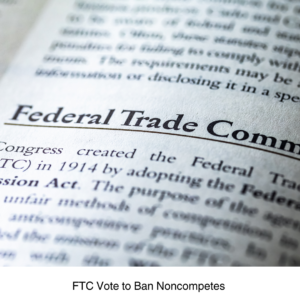
In April, the Federal Trade Commission (FTC) issued a final rule banning non-compete clauses throughout the U.S. The ban will protect the “fundamental freedom of workers to change jobs, increasing innovation and fostering new business formation,” according to the FTC. The commission estimates the final rule could lead to a 2.7% growth in new business formation each year and boost the number of patents from 17,000 to 29,000 each year.
“Non-compete clauses keep wages low, suppress new ideas and rob the American economy of dynamism, including from the more than 8,500 new startups that would be created a year once non-competes are banned,” said Lina M. Khan, FTC Chair. “The FTC’s final rule to ban non-competes will ensure Americans have the freedom to pursue a new job, start a new business or bring a new idea to market.”
Morefield, Speicher & Bachman LC, an Overland Park, Kan.-based business law firm, compared non-compete clauses and agreements to a shield originally created to protect employers from unfair competition by former employers. Depending on the situation and the employer enacting the clause, a non-compete could also be viewed as a shield or a way to prevent employees from leaving their employer for a better offer.
An estimated 30 million workers – nearly one in five – are subject to non–competes, according to the FTC. The rule does not apply to existing non-competes for senior executives, but this is only 0.75% of workers. This rule was first proposed in January and was subject to a 90-day public comment period. The FTC received more than 26,000 comments with 1,000 comments opposing the ban.
The new rule is slated to go into effect 120 days after it’s published in the Federal Register. But business groups opposed to the ban are expected to take legal action to prevent the new law from going into effect. The U.S. Chamber of Commerce said it will sue to block the rule.
“This decision sets a dangerous precedent for government micromanagement of business and can harm employers, workers and our economy,” said Suzanne Clark, President and CEO, U.S. Chamber of Commerce. “The Chamber will sue the FTC to block this unnecessary and unlawful rule and put other agencies on notice that such overreach will not go unchecked.”
A blog posted by Morefield, Speicher & Bachman LC stated that Kansas and Missouri each have its own state law that affects non-compete agreements. Missouri has also introduced HCS HB 1202, otherwise known as The Right to Start Bill, which would negate all new non-compete agreements “if an employee or prospective employee receives seventy-five thousand dollars or less in income from such employers or prospective employers.” This would look at employees making more than $75,000 a year differently. The HCS HB 1202 bill has not yet been signed into law.
With a range of interpretations in the law and differences from state to state, Morefield, Speicher & Bachman LC recommends employers stay current on these evolving issues, especially if the organization asks employees to sign a non-compete agreement.

